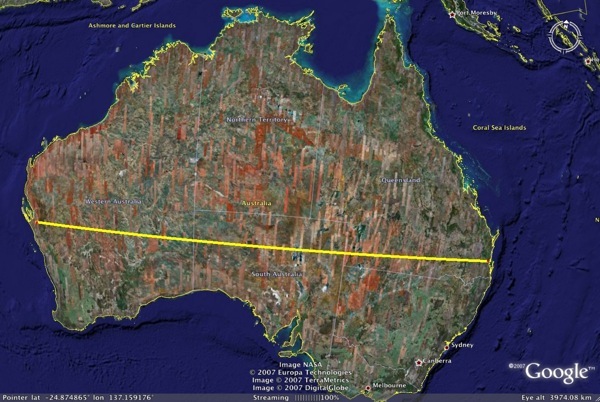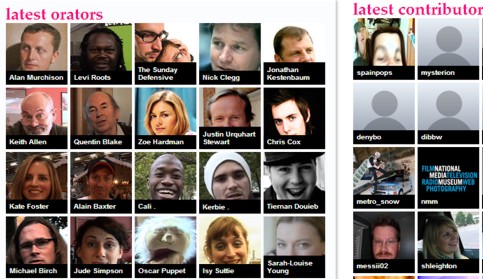You know how you can’t let some things go?
Well, the back of my mind is often processing ways to demonstrate to people the value of reading and writing blogs. Recently I read an educator’s comments about introducing teachers to Web 2.0 practices, where he says he wouldn’t start with blogging, but provide teachers with examples of great blogs to read. Often people considering blogging will say that they don’t know what to blog about. It’s a bit like a student getting an open essay topic; it’s difficult because it’s undefined. That’s why reading blogs of people who share your interests is a good starting point for new bloggers or even sceptics. What I’m actually saying is – you don’t know what you’re missing – there are people out there who are really worth knowing, in all parts of the world and in many spheres of life and occupation.
John Connell linked to a series of blog networking interviews by Lilia Efimova in his post about passionate bloggers. People whose blogs centred around knowledge management topics were interviewed by Lilia about how they used blogs for networking. What’s particularly interesting is the variety of backgrounds represented. Lilia’s interviews covered the following:
- professional background of a participant and characteristics of her network in KM field prior to blogging
- changes in the network or networking practices because of blogging
- uses of weblogs for developing, maintaining and activating relations as a starting point for articulating stages of the process at more granular level
- place of the weblog in the ecosystem of networking tools (mainly focusing on what weblogs are good for and when they do not work).
- important networking-related issues that haven’t been discussed
Here are some examples:
Brett Miller, a system engineer, says
“I know more people in different areas of KM when I knew before.” Blogging helped him to reach people he wouldn’t be able to reach otherwise.
Dave Snowden is a founder and a Chief Scientific Officer of Cognitive Edge, a consulting company focusing on complexity, sense-making and narratives. He was formerly a director of IBM Institute of Knowledge Management and founder of the Cynefin Centre for organisational complexity. He has about 50 science bloggers in his RSS reader.
“They scan journals for me, so I don’t have myself … I’ve learnt to trust them over the years … it’s much better than summarisation surface”.
Euan Semple is an independent advisor for social computing for business (www.euansemple.com). He started blogging with his personal weblog The Obvious. He says:
“Previously I was subject to geographical constraints or social constraints or organisational constraints as of who I was likely to meet and suddenly with online networks I’ve been able to connect to […] the whole bunch of interesting and interested people whom I suddenly had an access to in a way in a normal life I would never ever had that chance. I could then establish relationships and (and again something I get very hot about) is that these are not pretend or unreal or virtual relationship, the real relationship, where you build up trust and affect and those powerful things that make people work together. Online.”
And also:
[Blogging] is “a collective pointing that helps to find stuff, once you have an established group of bloggers you read and trust. And their ability to find a good stuff to point to it, increases your signal to noise ratio on the web … Blogs do that better than other tools because of the context – you have to say why that is important, why are you pointing to something”.
Luis Suarez works at IBM as social software evangelist. He is located in Spain, but travels frequently for his work. He says:
Weblogs allow you to get beyond what people publish and to get as sense of what a person is like – to build a profile of a person as a person, not a business entity. Not how long you have been married, but how people write articles. When you write a blogpost you are giving yourself out as a person. The line between life and work is going to disappear.
The question of blogs developing trust is an interesting one. Luis says that trust is developed through a ‘willingness to expose what you don’t know’, and ‘a willingness to learn not yet finished thinking’ or ‘taking a radical position that invites criticism’, ‘being brave and bold’. He added that ‘there is something special about somebody coming to your place to leave their words there’.
Talking about changes in professional network as a result of blogging, Monica Andre, who worked in a research lab in Lisbon focusing on information behaviour and information management, says:
“I didn’t realise that linking and giving credits to someone’s work would extend my professional network extended very quickly.” She then told a story of being contacted by a municipality government from Spain who wanted her to speak at an event. “I didn’t know I was followed by them. If [people] leave comments, you have a clue, a footprint. It turns out that guy who was reading my blog suggested the government that I would be a good person to talk as a keynote speaker”. When she received an email she thought it was a joke, but they called to confirm.
These are only a few examples of what people had to say about blogging in Lilia’s interviews, just to whet your appetite. You can read all interview summaries on Lilia Efimova’s blog Mathemagenic.
It’s difficult to ‘convert’ people to reading and writing blogs and to online networking in general for a variety of reasons I’ve spoken about many times in previous posts. It may be as difficult as religious or political conversion. To those of you reading this post, I’m preaching to the converted, I know. So please tell me, have you had successful experiences in converting those resistant to blogging that you would like to share?









